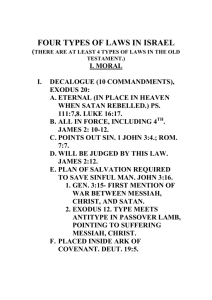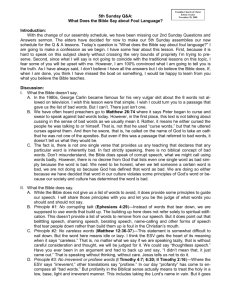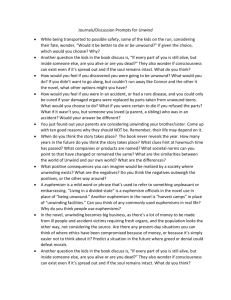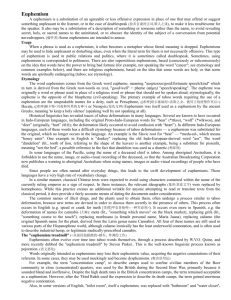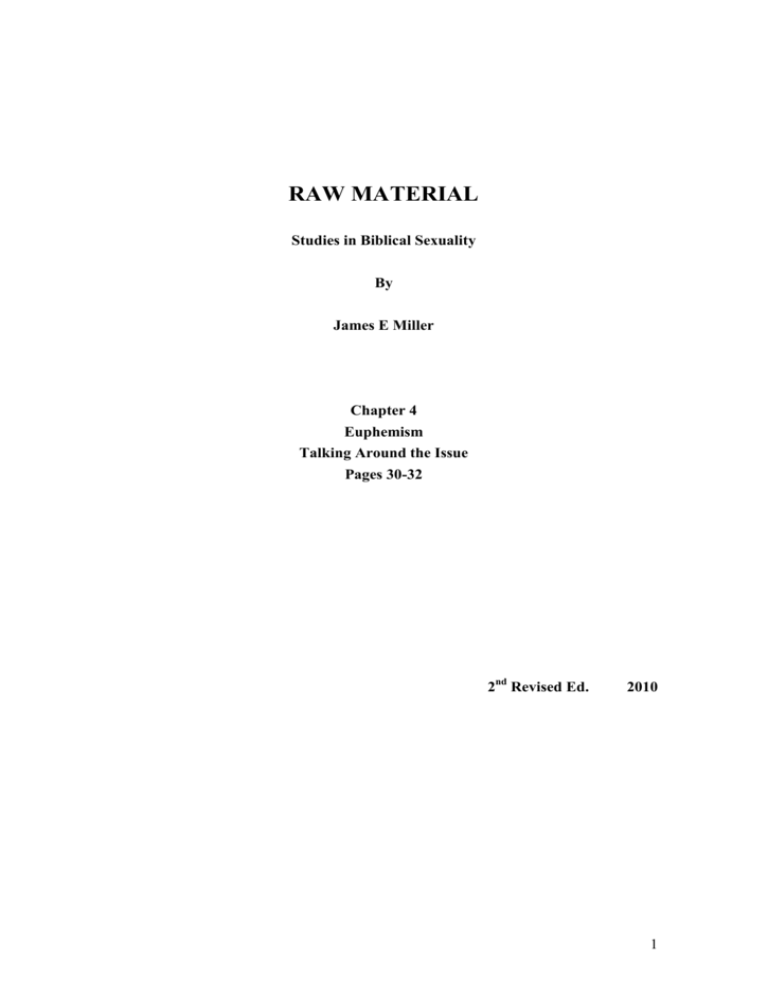
RAW MATERIAL
Studies in Biblical Sexuality
By
James E Miller
Chapter 4
Euphemism
Talking Around the Issue
Pages 30-32
2nd Revised Ed.
2010
1
Euphemism
Talking Around the Issues
Euphemisms abound in Hebrew when the topic is sexual body parts and
activities. Euphemisms for sexual terms, bodily wastes and death are common to most
languages. However, these euphemisms usually have common non-euphemistic terms
as well. In classical Hebrew, in spite of our extensive texts in and out of the canon, very
few non-euphemistic sexual terms are preserved. The strong showing of euphemistic
sexual terms may be related to the strong prohibition on nakedness.
The following are some of the more common euphemisms in the Hebrew
Scriptures.
The Sex Act
To Know: — ידעGen 4:1, 17, 25
To Go Into: — בוא אלGen 38:2,18
To Lie (With): — שכבGen 34:2 Often with ( זרעsemen/seed).
To Approach: — קרבLev 18:19
To Approach / Touch: — נגשEx 19:15
To Humble: — ענהGen 34:2; 2 Sam 13:12,14. There is a noun ענהfor the
conjugal rights of the wife (Ex 21:10). Probably the most loaded of the sexual
euphemisms in the Hebrew language, a man’s first sexual encounter with a woman is
sometimes described as him "humbling" her (e.g. Gen 34:2; Deut 22:24,29). The term
may specify rape, though this is not certain. The woman’s loss of legitimate status does
seem to be implied (van Wolde). The cognate noun does not indicate rape or loss of
status. The root ענהis complex and difficult to chart. Its two main meanings are
"answer" and "humiliate / afflict." Rabbis and most scholars understand the sexual term
to derive from the second meaning. However the first meaning, “answer”, should also
be considered as a possibility, making ענהsimilar to "know."
The Penis
Flesh: — בשרGen 17:11,14,23-25; Lev 15:2-19; Ezk 16:26; 23:20
Thigh: — ירךGen 24:2,9
Hand: — ידIs 57:8
Groin/Hips: — מתנים1 Kings 12:10
Spout (?): — שפכהDeut 23:1 (2). שפך, a verb, has the meaning of "pour / spill".
Feet / Legs: — רגליםEx 4:24-26, Zipporah touches Moses’ "feet." Is 6:2, the
Seraphim have a pair of wings to cover their "feet." Ruth 3:7, she uncovers the "feet" of
Boaz and lies down. In levirate transactions the foot and sandal are symbolic of the
2
semen provider — the levirate husband (Deut 25:5-10; Ruth 4:7-8). It is unlikely that
feet/legs is a euphemism for the female genitals. The female image functions well if
רגליםis translated without euphemism as "legs" (Deut 28:57; Ezk 16:25).
Urine = "foot water" — 2 Kings 18:27; Is 36:12. Pubic hair = "hair of feet" —
Is 7:20; Ezk 16:7.
Testicles
[ ] — No term. Deut 23:1(2) refers to something "crushed", and most scholars
assume that it is part of the male genitals. Translators and commentators usually
understand testicles as the crushed portion of the genitals.
Shameful items: — מבשיםDeut 25:11. The plural (dual?) form may either
specify the testicles or include the penis as well.
The Vagina
Flesh: —בשרLev 15:19 Like the male term.
Ejaculation
Flow: — זרמהEzk 23:20
Lying to Seed: — שכב לזרעLev 18:20, 23 (LXX)
Menstruation
The Way of Women: — דרך נשםGen 31:35
Flow: — זבהLev 15:19,25 A rare non-euphemism.
Impurity: — נדהLev 12:2; 15:20, 25; 18:19 The official result of menstruation.
Illness / Weakness: — דוהLev 12:2; 15:35; 20:18, possibly Is 30:22.
Period / Count: עדה/ — עדיםIs 64:5
Exceptions
Some terms are rarely if ever replaced by euphemisms, e.g. fornicate / prostitute
()זנה, commit adultery ()נאף, breast ()שד, womb ()רחם, semen/seed ( ) זרעTesticle ()אשך
occurs once in non-euphemistic form. There is an exceptional non-euphemism which
demonstrates the desire to use euphemism in the Hebrew texts. This non-euphemism is
the verb -שגל, a term for sexual intercourse considered too graphic to be spoken. The
verb occurs four times (Deut. 28:30; Isaiah 13:16; Jer 3:2; Zech 14:2), each text is very
harsh, and the rabbis substituted the euphemism ( שכבto lie with) in each case. The verb
שגלis not to be spoken, even when it occurs in the inspired text.
The two most common non-euphemisms are foreskin ( )ערלהand circumcise
()מול. Not only are the two terms specific and non-euphemistic terms concerning the
3
male genitals, but they also are used metaphorically for other concepts. Best known is
the expression of circumcising the foreskin of one’s heart (e.g. Deut 10:16; Jer 4:4). At
one point in the Law of Moses off-limits fruit trees are described as having a foreskin
(Lev 19:23-25) and thus being "uncircumcised." These terms can be juxtaposed to
euphemisms with no apparent difficulty. In Genesis 17:23-24 Abraham "circumcised
the flesh of his / their foreskin." Here the euphemism "flesh" is used with
non-euphemisms "circumcise" and "foreskin." The foreskin is the one part of the male
genitalia which truly entered common Hebrew conversation due to the importance of
infant circumcision in Israelite society, and the foreskin stood as a characteristic of
unclean outsiders.
The strong showing of euphemisms in the Biblical texts indicates a certain
modesty in ancient Israel concerning sexual matters. The only other subject attracting
this much euphemism is death, most often euphemised as "sleep." Their modesty did
not prevent common talk about sexual matters. However the euphemisms indicate,
along with the strong taboo on nakedness, that sexual matters were not treated as
common and were kept private as far as possible.
4


